From the halls of Montezuma to the shores of Taylor Lake
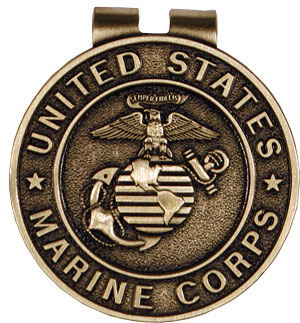 In the summer of 2014, just before Peter Coladarci ’18 pulled onto the shores of Taylor Lake for the first time, he spent the weekend white-water rafting in Pennsylvania with Kevin Varga ’16. Although it was their first time meeting, there was no need to test the waters of their soon-to-be friendship; as Marines, they assumed an instant bond.
In the summer of 2014, just before Peter Coladarci ’18 pulled onto the shores of Taylor Lake for the first time, he spent the weekend white-water rafting in Pennsylvania with Kevin Varga ’16. Although it was their first time meeting, there was no need to test the waters of their soon-to-be friendship; as Marines, they assumed an instant bond.
Currently, at Colgate, four Marine veterans are on a mission to secure a liberal arts education: Varga, Coladarci, Cory Nettnin ’16, and Dan Luntzel ’17. Their personalities differ greatly, but because of their shared experiences, a natural brotherhood exists. Varga and Nettnin were the first to come to Colgate through the Leadership Scholar Program, which assists Marines with college admissions nationally. They then welcomed Luntzel and Coladarci with an “Ooh Rah!”
General Tom Morgan ’52 tied the knot between the Leadership Scholar Program and Colgate. “The puzzle I was looking at was, what could we do to open the doors to veterans at Colgate,” said Morgan, who retired in 1988 as assistant commandant (the second-highest ranking officer) of the Marine Corps. He had been following the development of the national Yellow Ribbon Program as it came to fruition in 2008, bolstering tuition benefits to veterans through the Post-9/11 G.I. Bill. Morgan called up Gary Ross ’77, Colgate’s dean of admission, and got him on board. Next, Morgan reached out to his daughter, Beth Morgan, who is director of the Leadership Scholar Program and once worked in the student affairs division at Colgate. He also spread the word about Colgate’s strong liberal arts education to the senior commanders within the Marine Corps.
Through General Morgan’s efforts, Marines who are finishing their service learn about Colgate’s participation in these programs supporting veterans’ educations. In addition to offering Yellow Ribbon matching grants, Colgate goes above and beyond: vets who enroll will incur no more than $2,000 in tuition and all other charges (such as room and board) in any given year.
Varga, Nettnin, Luntzel, and Coladarci were introduced to Colgate through a Marine administrative message from Beth Morgan. Later, they received a personal introduction when Ross interviewed Varga, Luntzel, and Coladarci in California at Camp Pendleton (a base under the command of Brigadier General Edward Banta ’86, P’19), and spoke to Nettnin by phone.
On campus, they’ve lived together in various combinations, with the exception of Luntzel, who is married. The rafting trip was one example of how they welcomed each other and formed an alliance from day one. Their varied interests at Colgate take them in separate directions, but the four “get together every once in a while, just to see how everybody is doing,” Luntzel said. “We do share a bond that we don’t with our other classmates, even though we come from all different backgrounds.”
From the base of their little group, they’ve deployed into the Colgate community: interacting, enhancing, and providing a distinct perspective.
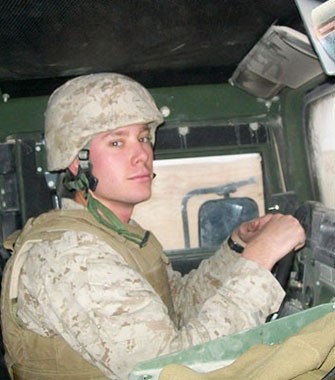 Kevin Varga
Kevin Varga
CLASS OF 2016
Age: 26
Rank: Corporal
Back in 2007, Kevin Varga ’16 knew what he didn’t know. Calm and positive by nature, he was preparing to graduate from high school, unfazed by the fact that he didn’t know what he wanted to do with his life or what he would study if he went to college. “[College] just didn’t seem like the right opportunity for me at the time,” he said.
Sitting at home in Moon Township, Pa., wasn’t an option, either. So Varga started a five-year journey to discover his calling. The first step took him to a Marine recruiter. One conversation led to another, and before long, he had signed on for a five-year enlistment with a contract in aviation electronics, “a great technical field where you could learn a lot,” he said.
Enlistment included a 687-mile trip south to the Marine Corps Recruit Depot at Parris Island, S.C., for basic and combat training, then 220 miles northwest to Athens, Ga., for computer training. Along the way, Varga went from high school graduate to computer systems specialist. He joined the fleet at Camp Pendleton, Calif., in July 2008, and spent the next 15 months maintaining computer software and network hardware for helicopter squadrons.
“I remember digging trenches to run cables through hard-packed desert. All of the networks are hard wired — no Wi-Fi. There was constant construction going on at the base, so crews would cut cables … there were quite a few problems.”
Varga’s training stateside was put into practice overseas in October 2009. He deployed with helicopter squadron HMLA 367 to Camp Bastion, a NATO base in Afghanistan’s southern Helmand Province. Fighting the swirling sand, Varga ensured that the squadron’s computers, which tracked maintenance and mission planning, operated properly. “[They] would constantly need to be cleaned out,” he said. “I remember digging trenches to run cables through hard-packed desert. All of the networks are hard wired — no Wi-Fi. There was constant construction going on at the base, so crews would cut cables … there were quite a few problems.” Varga also learned to fix large power generators — “other duties as required” in a war zone.
But that wasn’t the only knowledge Varga was gathering. Back at Camp Pendleton by May 2010 and looking forward to his discharge in April 2012, he received an e-mail from his father. It was a simple message to a number of family members, and it included photos of men spelunking into a South American cave. Varga replied all: “How do I do that for a living?” His mother responded with a one-word question, “Geology?”
Central Texas College offered an environmental geology course at Camp Pendleton, and Varga enrolled, tapping tuition remission offered by the Corps. “I really liked it, and that has been my plan ever since,” he said.
Varga executed his plan by applying to Penn State, Columbia, and Colgate through the Leadership Scholar Program. He received an admission offer from Columbia, but, on close consideration, “Colgate seemed like a better fit for me,” he said. Finally knowing what, where, and when, he arrived on campus with the Class of 2016 in August of 2012.
“It was like the anti–boot camp,” he said. “Instead of having a sergeant there shouting, ‘You are nothing!’ everybody was like, ‘We love you.’ It was cool to experience.”
“So many students get stressed out and worried. I constantly try to tell them, ‘Try to enjoy it. Relax a bit.’”
Varga joined the rugby team and the Hamilton Volunteer Fire Department, where he is now a certified EMT. While he hasn’t yet had the chance to rappel into a South American cave, he did conduct geological field research across the western United States with Professor William Peck. He also has participated in Colgate’s Australia study group, joined extended study trips to Ecuador and New Zealand, and is making plans to research his senior thesis in the Galapagos Islands with Professor Karen Harpp.
Varga has brought a new perspective to the classroom, whether abroad or in Hamilton. “It’s just having an appreciation for the little things,” he said. “So many students get stressed out and worried. I constantly try to tell them, ‘Try to enjoy it. Relax a bit.’”
What lies ahead for the Marine veteran who’s soon to be a Colgate veteran as well? “If I could become a volcano technician, that would be my dream job.” Not bad for a small-town kid who was unsure of what to do with life after high school. It turns out that, in some cases, what you don’t know can actually help you.
“CORPS” LESSON: “Always have my s*** together. In better terms, be self-driven.”
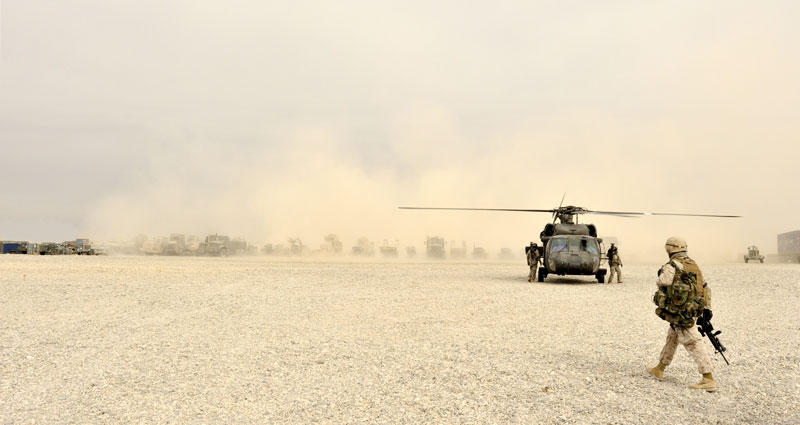
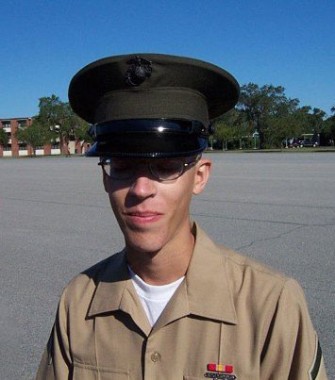 Cory Nettnin
Cory Nettnin
CLASS OF 2016
Age: 26
Rank: Sergeant
Cory Nettnin ’16 arrived at his new Washington, D.C., duty station in the summer of 2010. The signals intelligence specialist was there to make sure that the machines that encrypt secret messages were firing on all cylinders. Before long, he found himself moving the cylinders — from the Navy Annex in Arlington, Va., to new offices in the Pentagon.
Nettnin and seven other Marines worked nearly around the clock for two days, moving and reinstalling more than 300 computers, printers, and phones. “Our office essentially ran intelligence operations for the Marine Corps,” he said. “We needed to be down for as little time as possible.” Those 48 hours formed a defining moment in his military experience. They also affirmed that Cory Nettnin is first and foremost a man of action.
Preparing to graduate from high school in 2007, Nettnin wasn’t interested in continuing with school, but he still wanted to learn and to do something meaningful with his life. So he singled out the Marines for his first full-time job. “The Marines offered the biggest challenge,” Nettnin said. “I just figured I’m already going to go out of my way to do the most challenging thing in my life, so I might as well go all the way.”
“All the way” meant boot camp at Parris Island, S.C., specialized computer training in Pensacola, Fla., and his first duty station in Okinawa, Japan. From there, Nettnin was deployed to Thailand, the Philippines, and Australia. After a brief return to Japan from mid-2009 to mid-2010, he was sent to Washington, D.C., where he finished out his enlistment in 2012.
“I just figured I’m already going to go out of my way to do the most challenging thing in my life, so I might as well go all the way.”
Along the way, the Corps changed certain aspects of Nettnin’s personality. “I’m not big on talking in general,” he admitted. But, he was constantly meeting new people while working in an IT customer-service environment. Some of those people outranked him, though they might be younger, and some ranked below him, though they might be older. So interpersonal communication in the Corps forced him out of his quiet comfort zone while challenging his intellect, making good on the promise that Marine life would offer the biggest challenge. “It’s pretty easy for me to talk to random people at this point.”
This determined, quiet communicator arrived at Colgate with the Class of 2016 and attended first-year orientation, not because the administration required it, but because he wanted to be able to identify the programs that would be useful for future Leadership Scholar Marines. “I didn’t really know anybody, so it was a good use of my time,” he explained. Practical curiosity also led Nettnin, a computer science major and avid gamer, to take over the leadership of Game’s Afoot and the Trading Card Game Club. He joined the Ballroom Dancing Club and, after three appearances at Dancefest, has proved to be a quick study on the quickstep. Discovering a love for Middle Eastern studies, he joined the Muslim Student Association. “I’m Christian,” he said. “I’m there to experience something new, learn about something I don’t really know about.”
Nettnin, a newly promoted senior, can look back over the past three years and see how his time in the Corps influenced his Colgate experience. He’s still seeking challenges. And he’s still quiet, but capable of engaging strangers in conversation. Sometimes, though, he prefers just to listen: “In classes, I don’t usually speak up too much because I like to hear the viewpoints of people who haven’t been in my situation.” But don’t let the quiet demeanor mislead you. This former Marine will work all night to achieve an objective, complete an assignment, or beat you in a game of League of Legends.
“CORPS” LESSON: “Show up early; work as hard as you can, whether you enjoy doing it or not; and volunteer for things, whether or not you want to do them.”
Peter Coladarci
CLASS OF 2018
Age: 24
Rank: Sergeant
Perched atop a truck traveling the dusty roads of Afghanistan at high speeds, Peter Coladarci ’18 had the best seat in the house — at least, from his perspective — when he was deployed.
“I had my M-240 Bravo attached in the turret, then I had another rifle, a pistol on my hip, and two grenades and a rocket launcher in the truck,” he said. “I was ready to go.”
Coladarci chose this position because, from day one, he wanted to be at the center of the action. In fact, he went into the service because he was inspired by the story of the SEAL snipers who saved Captain Richard Phillips, the merchant mariner who was held hostage by pirates in 2009. Coladarci was a first-year student at the University of Nebraska–Lincoln at the time and read the newspaper daily. After encountering the article about the snipers’ operation to save Phillips, Coladarci went to see a recruiter. Lack of 20/20 vision in both eyes disqualified him from that possibility, so he signed up for the Marines.
“You join to deploy. It’s like our game: all the practice, all the training, you want to play eventually.”
After celebrating his 20th birthday in boot camp, he was sent to Twentynine Palms, Calif. Located in the Mojave Desert, the Air Ground Combat Center is where Marines train before overseas deployment, but it was Coladarci’s permanent base. “It’s the hottest place I’ve ever been, and there’s no fresh water. It’s probably one of the worst places on earth,” he said with a smirk. “It was originally an Air Force Base, but they deemed it inhospitable for human life, so the Marines snagged it right up,” he joked. There, he learned everything from operating different heavy machine guns to driving and maintaining a Humvee. In early July of 2011, he got word that he would be deployed to Afghanistan in three months.
“I was a little nervous; I wasn’t sure what to expect,” he recalled. “But, that’s what I had been looking forward to. You join to deploy. It’s like our game: all the practice, all the training, you want to play eventually.”
Stationed in Kabul’s Camp Phoenix, Coladarci was part of convoy security for the Afghan National Army as they transported arms, ammo, and equipment. He convinced his superiors to “put me up in the machine gun [turret] — it’s probably the most dangerous job.”
Driving through chaotic traffic, Coladarci’s responsibility was “looking for an anomaly in the baseline,” he said. “You have to be able to tell, if you look at a town and there are no females, or if people are doing something shady with their body language, something might be up,” he explained. “It’s learning to see things that most people wouldn’t.”
Taking trips lasting several hours and some lasting several days, he saw much of the country. “We went up north over the mountains a few times, which is very different. It was pretty cool going through all these tunnels that the Russians built when they were fighting there, so from a historical perspective, it was interesting to travel those roads.”
Coladarci spent seven months in Afghanistan, with no off days. In June of 2012, he returned to Twentynine Palms for two years. In that time, he was promoted through the ranks: vehicle commander, then squad leader, and finally a section leader, in charge of 24 Marines. (This past January, right before finishing his active duty, he was promoted to sergeant.)
“It was pretty cool going through all these tunnels that the Russians built when they were fighting there, so from a historical perspective, it was interesting to travel those roads.”
“I had plenty of time to think about going back to school,” Coladarci reflected. “One day, I was out training in the field, it was about one hundred and twenty degrees outside, and I was sitting in a Humvee. I decided at that point that I really wanted to take an Italian course in college.” So, when he received an e-mail stating that Colgate was accepting Marines into the Class of 2018, Coladarci went for it.
In his first semester at Colgate, Coladarci took that Italian class, and followed through with his second promise to himself by joining the baseball club. He’s considering majoring in economics, but is keeping an open mind. “I’m trying to get a broad education, and Colgate’s good at that.”
As a gunner in the Marines, his job was to survey the landscape and assess the situation. Now Coladarci is among the ranks of Colgate students who are looking for the unexpected, thinking critically, and drawing meaningful conclusions.
“CORPS” LESSON: “I can always push myself a little harder, and my limits are beyond what I thought they were.”
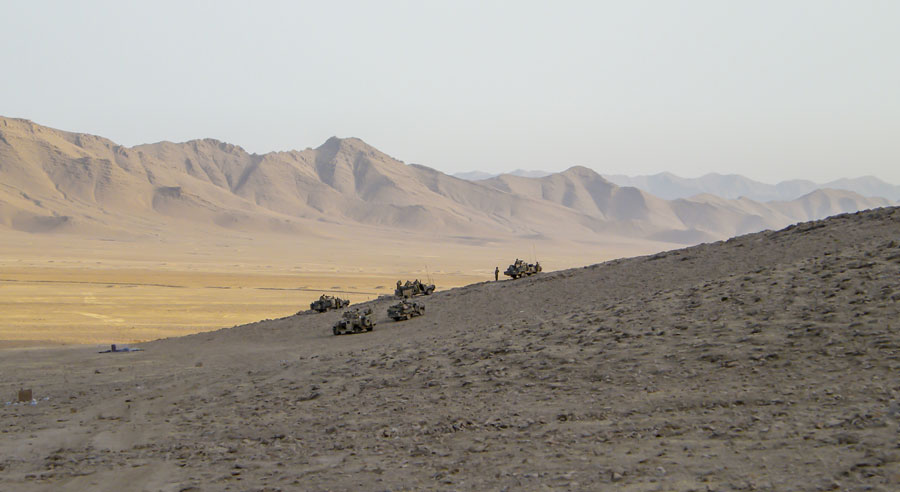
Daniel Luntzel
CLASS OF 2017
Age: 33
Rank: Staff Sergeant
Improvise, adapt, and overcome — it’s an unofficial slogan for the Marines, and it’s a mind-set that Dan Luntzel ’17 wants to help Colgate students embrace.
Through the Thought Into Action Entrepreneurship Institute, Luntzel has advanced an initiative he calls disruptEd. The project is to build a makerspace at the university, which will start with 3D printers and grow to include other tools to foster creative endeavors, from woodworking to gardening to knitting.
“It’s an incredibly empowering and transformative experience to create something,” said Luntzel. “The maker movement is all about open-source collaboration and sharing information, technology, and skills.”
Luntzel believes that his vision will complement the liberal arts education and better prepare students for their careers. “I see flexibility, creativity, and perseverance as some of the critical skills for success in a changing world. ‘Making’ is a good step toward [developing] these traits,” he explained, “because when you take an idea out of your head and manifest it in real space, you often encounter challenges that you didn’t see at the outset of the project, then have to learn an entirely new skill set and re-attack.”
“It’s an incredibly empowering and transformative experience to create something.”
In his own life, Luntzel has had to change tack in response to the unexpected. Growing up, his dream was to join the Air Force, just like his father and grandfather. As he was about to graduate from high school, he found a congressional sponsor and survived several rounds of cuts before getting waitlisted for the Air Force Academy and ultimately not being accepted. Instead, he secured a Naval ROTC scholarship at the University of San Diego. But, ROTC, classes, and a night job overextended the young man; he dropped out.
At the university, Luntzel had met a group of Marines whom he admired, and they helped him to ultimately get his career off the ground. One, in particular, talked to him about reconnaissance, “and it sounded really exciting: parachuting, diving, shooting — the G.I. Joe stuff.” So, Luntzel enlisted, and when the opportunity arose, he volunteered for the reconnaissance unit. “It was reputably the most difficult place to get into in the Marine Corps, so that attracted me.”
During Luntzel’s approximately 10 years in the service, he completed three Marine Expeditionary Unit deployments on a ship that traveled the Pacific Ocean, spent a number of years in Okinawa (where he met his wife, who’s Japanese), and did recon in Iraq for seven months. For his last four-and-a-half years in the Marines, Luntzel was an instructor in Okinawa, teaching a range of skills: from marksmanship to team tactics to boarding ships.
It was a natural transition for Luntzel to continue as an instructor during his eight months of terminal leave before coming to Colgate. He worked for a small defense contract company in northern Virginia, where they were hired to train the Boston SWAT team and his former unit in Okinawa.
As a Colgate student, Luntzel began to really think about education and the future: what skills should he and his fellow students be learning to help them succeed? When retired Navy SEAL Mark Divine ’85 delivered an inspirational keynote during the 2014 Homecoming, Luntzel took note: “He talked about writing your own story, not letting someone hand you a script.
“I thought, how could I help shift the educational culture here on campus, from students being passive receivers of education toward self-directed, active learners?” His solution: a makerspace.
“Being an instructor and working in uncertain and dynamic environments, I learned that success in a fluid, changing world is about personal skills and character traits,” Luntzel said.
“I thought, how could I help shift the educational culture here on campus, from students being passive receivers of education toward self-directed, active learners?”
Admitting that he has “grand ambitions,” Luntzel has planned a phased rollout for disruptEd. At the end of the spring semester, he received approval for a Makers’ Club. At press time, Luntzel was about to launch a website where people could donate to fund the purchase of equipment. And, this summer, Colgate’s ITS department hired him to facilitate their own 3D printer initiative. Next semester, one printer (possibly two) will be available for public use at the Digital Learning and Media Center in Case Library.
“Colgate is perfectly poised to set the tone nationally for the role of making-culture in the liberal arts,” he said.
While talking with the Scene, the dual computer science and philosophy major was wearing a shirt that stated, “The future is not what it used to be.” Well, the future may be shifting, but Luntzel will adapt — and create some changes of his own.
“CORPS” LESSON: “If you have heart, you’ll be able to overcome any other shortcomings you might have.”
“Each one of these young men is what we seek in all of our applicants,” admission VP Ross said. “They’re high-achieving individuals, and they seek a challenging liberal arts education.” That said, they also bring “a diversity of experience based on their service to our country, and that makes Colgate a stronger campus,” Ross noted.
In this way, the university is benefiting twice from the devotion to country that Varga, Nettnin, Coladarci, and Luntzel demonstrated in the Marine Corps. For years, they kept us safe. Now, they’re expanding the minds of their classmates as they prepare for future adventures as alumni. Ooh rah, indeed.
WATCH
Bob Woodruff ’83 interviewed these students on Veterans Day:
Background photo by Dan Luntzel


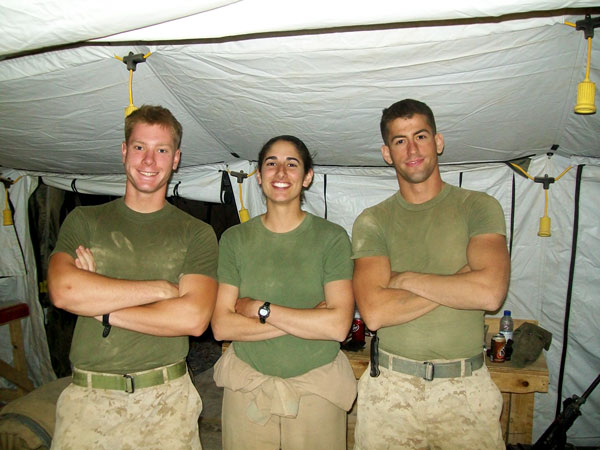
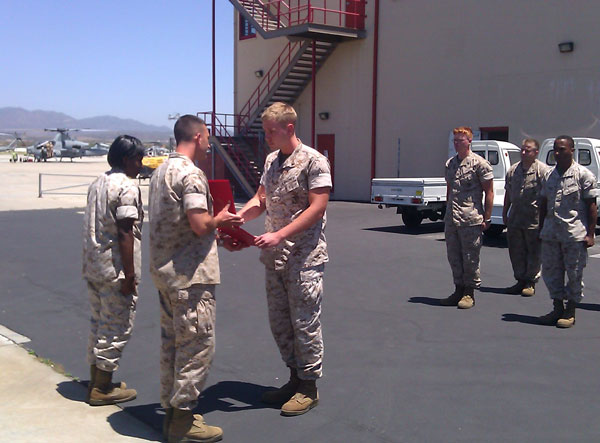
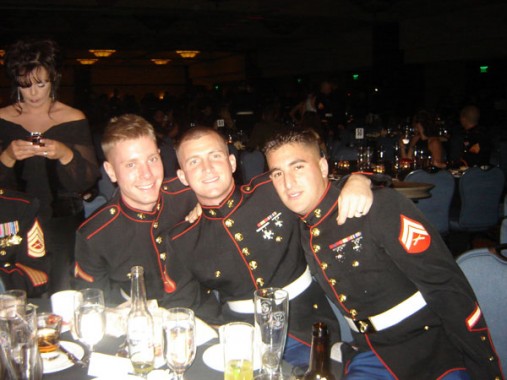
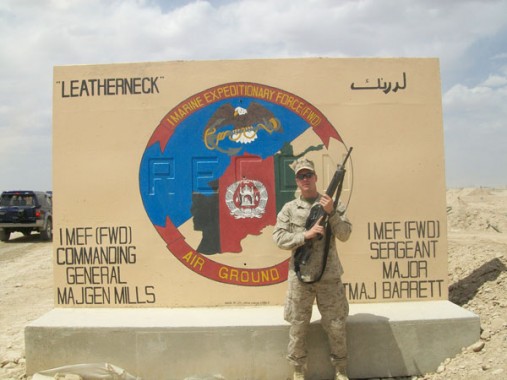
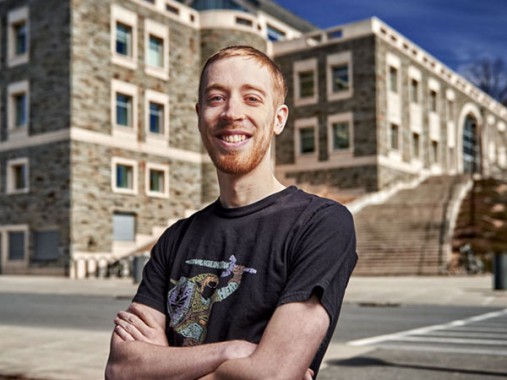

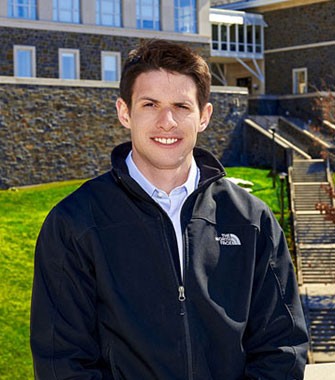
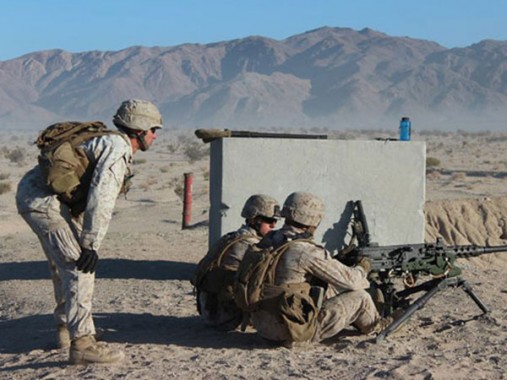
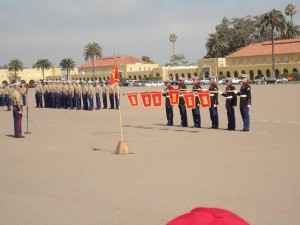
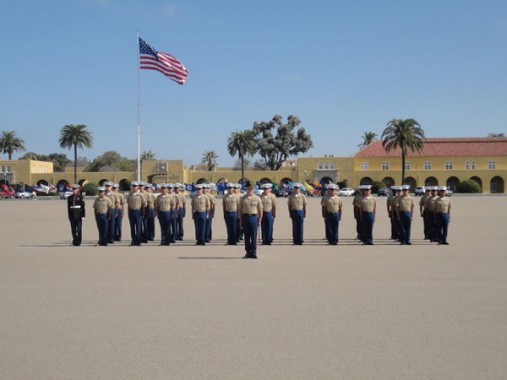
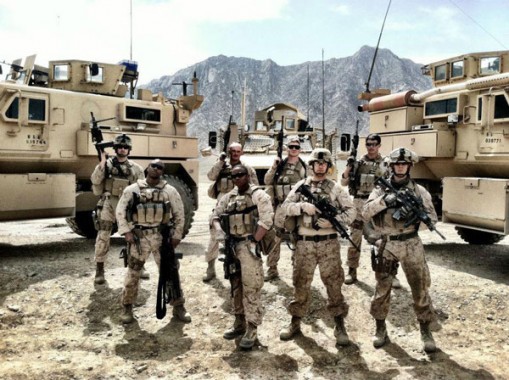
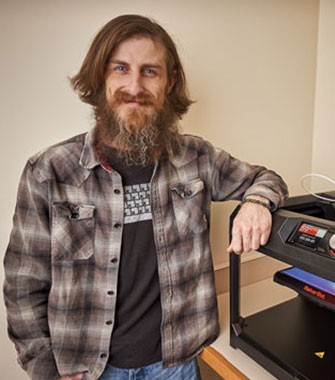
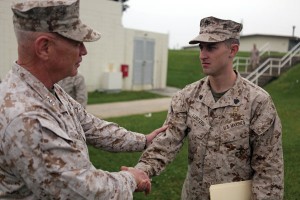
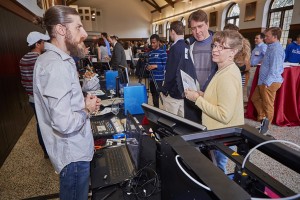
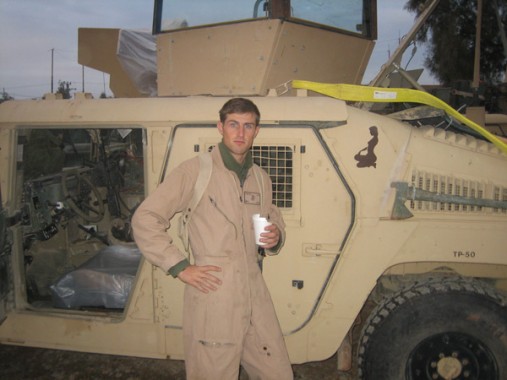
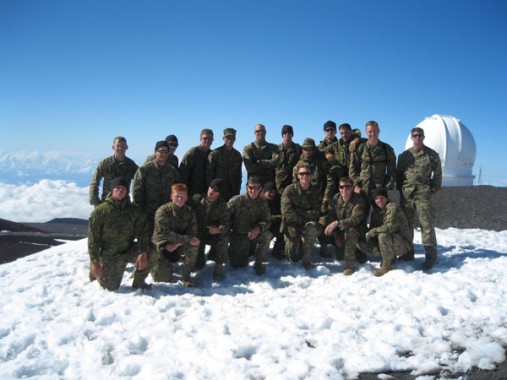





Great Job Marines! Semper Fi! Maj Walker C Koury USMC Class 2002.
2/2 2003-2006
3/6 2007-2009
2/3 2010-2011
3/3 2012-2014
Great Job Marines! Semper Fi! Maj Walker C Koury USMC Class 2002.
2/2 2003-2006
3/6 2007-2009
2/3 2010-2011
3/3 2012-2014